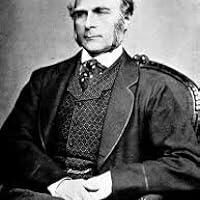
Francis Galton
关于作者
Francis Galton was a prominent Victorian polymath known for his pioneering contributions to various fields including statistics, psychology, and anthropology. He is particularly recognized for founding the field of eugenics and for his work in developing methods of statistical analysis. Galton's innovative ideas, such as the concept of correlation and regression towards the mean, have had a lasting impact on the social sciences and genetics. His work laid the groundwork for future research into heredity and human ability, and he was instrumental in the establishment of the first weather map and the development of fingerprinting as a means of identification.
Throughout his life, Galton was deeply interested in the application of statistical methods to social issues and human behavior. He authored numerous books and papers, advocating for the use of scientific methods to study and improve human populations. His legacy is complex; while he greatly advanced statistical science, his ideas about eugenics and racial superiority have been widely criticized and misused. Despite this, his contributions to statistical methodology remain influential in contemporary research, and he is regarded as one of the early figures in the field of behavioral genetics.